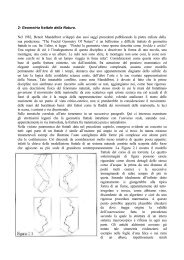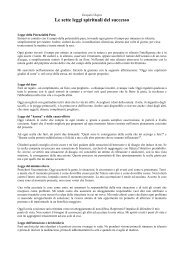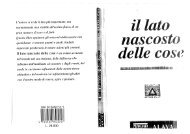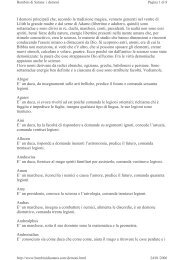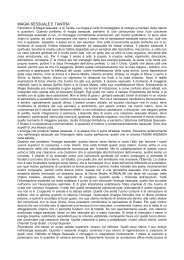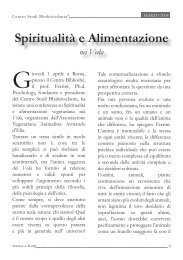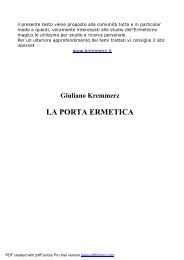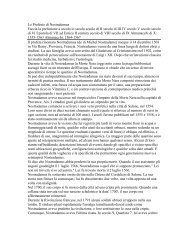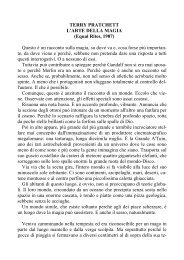68 TAUBANhumanitarian demand on the Taliban to lift their blockade on Bamiyan.It was the first time in the past 20 years of conflict that one faction hadused food as a weapon of war against another and it demonstrated theescalation in the ethnic and sectarian divisions that were consumingAfghanistan.The Hazaras had always been at the short end of the Pashtun stick, butnever to such an extent. These short, stocky people with their distinctiveMongol features were, according to one theory, the descendants of intermarriagebetween Genghis Khan's Mongol warriors and the indigenousTajik and Turkic peoples. In 1222 Genghis Khan's grandson was killedby Bamiyan's defenders and, in revenge, he massacred the population. 1For one thousand years before that Bamiyan was the centre of Buddhismin India and an important serai or resting place for the camel caravans on:the ancient Silk Route, which linked the Roman Empire with CentralAsia, China and India. Bamiyan remained the protector and capital o|Buddhism for the whole of Central Asia and India after the Islamic conquests.A.Korean monk, Hui-chao who arrived in the town in 827 ADwrote that the King of Bamyan was still a Buddhist and it was not untilthe eleventh century that the Ghaznavids established Islam in the valley.The town is still dominated by two magnificent second-century ADBuddha colossi, carved into a sandstone cliff face. The two statues, one165 feet high, the other 114 feet high, are weathered and cracked whilethe faces of both the Buddhas are missing, but their impact is stunning.The figures are carved with the classical features of all sub-continentalBuddhas, but the figures are draped in Greek robes for they representedthe unique fusion of classical Indian and Central Asian art with Hellenism,introduced by the armies of Alexander the Great. The Buddhas were!one of the wonders of the ancient world, visited by pilgrims from China;and India.Thousands of Buddhist monks once lived in the caves and groicarved into the cliffs alongside the statues. These caves, covered wiiantique stuccoes, were now home to thousands of Hazara refugees whohad fled Kabul. The Taliban threatened to blow up the colossi when theycaptured Bamiyan, generating high-level protests from Buddhist communitiesin Japan and Sri Lanka. In the meantime they had bombedmountain above the Buddhas eight times, creating more cracks insandstone niches that held the figures.The Hazarajat had remained virtually independent until 1893 when iiwas conquered by the Pashtun King Abdul Rehman, who initiated thefirst anti-Hazara programme, killing thousands of Hazaras, moving thousandsmore to Kabul where they lived as indentured serfs and servants,and destroying their mosques. The estimated 3-4 million Hazaras arelargest Shia Muslim group in Afghanistan. The sectarian enmity betwiBAMIYAN 1998-2000: THE NEVER-ENDING WAR ~ 69the Sunni Pashtuns and the Shia Hazaras went back a long way, but theTaliban had brought a new edge to the conflict for they treated all Shiasas murwfaqeen or hypocrites and beyond the pale of true Islam.Even more irksome for the Taliban, was that Hazara women were playinga significant political, social and even military role in the region'sdefence. The 80-member Central Council of the Hazara's Hizb-e-Wahadat party had 12 women members, many of them educated professionals.Women looked after UN aid programmes and Wahadat's effortsto provide basic literacy, health care and family planning. Women oftenfought in battle alongside their men - some had killed Taliban in Mazarin May. Female professors, who had fled Kabul had set up a universityin Bamiyan, probably the poorest in the world where classrooms wereconstructed with mud and straw and there was no electricity or heatingand few books.'We detest the Taliban, they are against all civilization, Afghan cultureand women in particular. They have given Islam and Afghan people abad name,' Dr Humera Rahi, who taught Persian literature at the universityand had emerged as a leading poet of the resistance, told me. Nor didthe Taliban appreciate Hazara women's style of dress. Dr Rahi and hercolleagues wore skirts and high-heeled boots. The poetry of Humera Rahiseemed to echo the Hazaras' new found confidence after centuries ofoppression at the hands of the Pashtuns.'Victory is yours and God is with you, victorious army of Hazarajat. Mayyour foes' chests be the target of your rifle barrels. You are the winner, thevictorious, God is with you. My midnight prayers and my cries at dawn,and the children saying "O Lord, O Lord!", and the tears and sighs of theoppressed are with you.' zDespite the siege and decades of poor treatment and prejudice by thePashtun rulers of Kabul, the Hazaras were now on a roll. They had beeninstrumental in defeating the Taliban in Mazar in May and again inOctober 1997. They had also repulsed repeated Taliban attacks againstBamiyan. The Hazaras had once made up the third and weakest link inthe Uzbek-Tajik-Hazara alliance confronting the Taliban, but now withthe Uzbeks divided and in disarray and the Tajiks in a position of stalematearound Kabul, the Hazaras sensed that their time had come. 'Ourbacks are to the Hindu Kush and before us are the Taliban and theirsupporters Pakistan. We will die but we will never surrender,' Qurban AliIrfani, the defiant deputy chief of Wahadat told me, as we sat trying towarm ourselves in front of a log fire in a room that overlooked theBuddhas, spectacularly draped in moonlight.There was a new found confidence and pride in their organization andtheir fighting prowess. 'We saved the north from the Taliban,' saidAhmed Sher, a 14-year-old Hazara soldier, who had already seen two
70 ~ TALIBANyears of battle and held his kalashnikov like a professional soldier. TheHazaras were not without friends. Iran was flying in military supplies to anewly constructed two-mile-long landing strip outside Bamiyan andKarim Khalili, the leader of Wahadat, spent the winter visiting Tehran,Moscow, New Delhi and Ankara looking for more military aid.But the Hazaras had also overstretched themselves. There were severalfactions amongst them, all competing for territory, influence and foreignaid. Separate factions of Hizb-e-Wahadat each controlled a part of Mazarand they fought each other as well as the Uzbeks, turning Mazar into awar zone and the anti-Taliban alliance into a political shambles. Iranianand Russian intelligence officers made several attempts at mediatingbetween Dostum, who was then based in Shiberghan, and the Hazaras, as:well as between the Hazara factions, but no side would compromise. InFebruary 1998, as heavy fighting erupted inside Mazar between the Uzbeksand the Hazaras, Masud paid his first visit to Tehran to try and persuadethe Iranians to do something to save the anti-Taliban alliance before itjwas too late. Meanwhile the Taliban sat out the winter, watching theirenemies tear each other apart while tightening the siege around Bamiyanand preparing for another attack on Mazar.Fighting continued through the winter months in the western provinceof Faryab, where the Taliban carried out another massacre in January Ithis time of some 600 Uzbek villagers. Western aid-workers who lateinvestigated the incident said civilians were dragged from their homeslined up and gunned down. International censure against the Taliban'ipolicies escalated as they imposed ever stricter Islamic laws and punishmentsin Kabul. The public amputation of limbs, lashings, stoning oijwomen and executions became weekly events in Kabul and Kandahar.International Women's Day on 8 February 1998 was dedicated to thiplight of Afghan women under Taliban rule. A hearing in the USon the Afghan gender issue attracted widespread publicity, as did condemnnation of the Taliban's policies by such luminaries as Hillary Clinton.The Taliban issued new edicts, stipulating the exact length of befor males and a list of Muslim names with which newborn childrento be named. The Taliban shut down the few home schools for girls twere operating in Kabul, as the religious police went on a rampage forciall women off the streets of Kabul and insisting that householdblackened their windows, so women would not be visible from the outside.Women were now forced to spend all their time indoors, where not evisunlight could penetrate. Taliban hardliners were determined to forceUN aid agencies out of Afghanistan and they provoked a number of incidents that tested UN patience to the limit.On 24 February 1998 all UN staff pulled out of Kandahar and hatoaid operations there after senior Taliban leaders beat up UN staffBAMIYAN 1998-2000: THE NEVER-ENDING WAR ~ 71threatened them. Mullah Mohammed Hassan, the usually mild-mannered,one-legged Governor of Kandahar, threw a table and a chair at the headof one UN official and then tried to throttle him, because he had refusedto pave a road in Hassan's village. In March, the Taliban refused to allowAlfredo Witschi-Cestari, the head of UN humanitarian aid operations tovisit Kabul for talks. And the UN remained deeply frustrated by the Talibansiege of the Hazarajat. 'In the north there is complete insecurity forour aid operations and in the south we have a hell of a horrible timeworking with the Taliban. In the north there is no authority and in thesouth there is a very difficult authority,' Lakhdar Brahimi told me. 3Despite these problems Brahimi attempted to set up a meeting betweenthe Taliban and the anti-Taliban alliance. Anxious to avoid meeting theopposition's leaders and thereby give them further legitimacy, the Talibansuggested a meeting of ukma from both sides. For several months theysquabbled with each other as to who qualified to be an ukma. The UNmustered the help of the US. Bill Richardson, President Clinton's foreignpolicy troubleshooter and the US Ambassador to the UN, visitedAfghanistan for a day of parachute diplomacy on 17 April 1998 and persuadedboth sides to convene the ukma meeting.Both sides were trying to woo the US and the flamboyant Richardsonreceived a rapturous reception. He was deluged with gifts of carpets,saddlebags and turbans. In Kabul the Taliban allowed the accompanyingUS TV crews to film their leaders for the first time and, as a courtesy toRichardson, they postponed their regular Friday public spectacle of lashingsand amputations in the city's football stadium. But although theTaliban leaders in Kabul promised to ease the siege of Hazarajat and discusstheir gender policies with the UN, Mullah Omar rejected the agreementjust a few hours after Richardson left.The ukma met in Islamabad under UN auspices at the end of Apriland after four days of talks each side agreed to nominate 20 ukma to apeace commission, which would decide on such issues as a cease-fire, liftingthe Taliban siege on the Hazarajat and an exchange of prisoners.However, the Taliban then refused to nominate their delegation and byMay another peace process had collapsed - even as the Taliban prepareda fresh offensive.Part of these preparations involved a fresh escalation with the UN. InJune the Taliban stopped all women from attending general hospitals andordered all female Muslim UN staff travelling to Afghanistan to be chaperonedby a mehram or a blood relative - an impossible demand to meet,especially as UN agencies had increased the number of Muslim femaleaid-workers, precisely so as to satisfy Taliban demands and gain access toAfghan women. The Taliban then insisted that all NGOs working inKbl move out of their offices and relocate to the destroyed building of
- Page 1 and 2: YALE NOTA BENE"The broader storyher
- Page 3 and 4: TalibanMilitant Islam,Oil and Funda
- Page 5 and 6: Vi ~ CONTENTSChapter 8A Vanished Ge
- Page 7 and 8: AFGHANISTAN•^ UZBEKISTAN J TAJIKI
- Page 9 and 10: 2 ~ TALIBANaccounts for some 40 per
- Page 11 and 12: "6 ~ TALIBANgas riches of landlocke
- Page 13 and 14: 10 ~ TALIBANgious mix that was to m
- Page 15 and 16: Part 1History of theTaliban Movemen
- Page 17 and 18: 18 ~ ISLAM OIL AND THE NEW GREAT GA
- Page 19 and 20: 22 ~ ISLAM OIL AND THE NEW GREAT GA
- Page 21 and 22: 26 ~ ISLAM OIL AND THE NEW GREAT GA
- Page 23 and 24: 30 ~ ISLAM OIL AND THE NEW GREAT GA
- Page 25 and 26: 34 TALIBANKabul- Hikmetyar had alli
- Page 27 and 28: 38 ~ TALIBANrHERAT 1995: GOD'S INVI
- Page 29 and 30: 42 ~ TALIBANdo manage to take Kabul
- Page 31 and 32: J46 ~ TALIBANgreater weight to UN e
- Page 33 and 34: 50 ~ TALIBANas they hung from steel
- Page 35 and 36: 54 ~ TALIBANthey would help rearm t
- Page 37 and 38: 58 TALIBANGul Mohammed Pahlawan, Gh
- Page 39 and 40: 62 TALIBAN2,500 Taliban, who had re
- Page 41: 66 TALIBANshould throw all aid agen
- Page 45 and 46: 74 ~ TALIBANThousands of Hazaras we
- Page 47 and 48: 78 TALIBANhas become a plague,' sai
- Page 49 and 50: NEW STYLE FUNDAMENTALISM OF THE TAL
- Page 51 and 52: 86 TALIBANsity students - Hikmetyar
- Page 53 and 54: 90 TALIBANSharia was heavily influe
- Page 55 and 56: 94 TALIBANinflamed the debate in th
- Page 57 and 58: 98 TALIBANizing factor of Islam, it
- Page 59 and 60: 102 TALIBANadministrations made the
- Page 61 and 62: 106 ~ TAUBANfrom working, but it no
- Page 63 and 64: TALIBANUniversity, she held down a
- Page 65 and 66: 114 TALIBAN A VANISHED GENDER 115Ta
- Page 67 and 68: 118 TALIBANUS$1,300 - a small fortu
- Page 69 and 70: 122 TALIBANper cent of the total Pa
- Page 71 and 72: 126 TALIBANequipment, no electricit
- Page 73 and 74: 130 ~ TALIBANfight with the Mujahed
- Page 75 and 76: 134TALIBANAugust 1996 noted that Bi
- Page 77 and 78: 138 ~ TALIBANwho were using the Kho
- Page 79 and 80: 11DICTATORS AND OILBARONS: THE TALI
- Page 81 and 82: 146 TALIBAN DICTATORS AND OIL BARON
- Page 83 and 84: 150 — TALIBANgrowth of beards and
- Page 85 and 86: 154TALIBAN1998 when international o
- Page 87 and 88: 158 ~ TALIBANaround Afghanistan? Af
- Page 89 and 90: 162 TALIBAN ROMANCING THE TALIBAN 1
- Page 91 and 92: 166 TALIBAN ROMANCING THE TALIBAN 1
- Page 93 and 94:
ROMANCING THE TALIBAN 2: 1997-99 17
- Page 95 and 96:
174 — TALIBANnon-Russian pipeline
- Page 97 and 98:
178 — TALIBANROMANCING THE TALIBA
- Page 99 and 100:
182 ~ TALIBANApril 1999. 'The US ha
- Page 101 and 102:
186 ~ TALIBANters or the transport
- Page 103 and 104:
190 ~ TALIBANThis Wild West of free
- Page 105 and 106:
194 ~ TALIBANgovernance. Pakistani
- Page 107 and 108:
198 TALIBAN SHIA VERSUS SUNNI: IRAN
- Page 109 and 110:
202 TALIBAN SHIA VERSUS SUNNI: IRAN
- Page 111 and 112:
206 — TALIBANin Afghanistan - to
- Page 113 and 114:
210 — TALIBANand antagonism. The
- Page 115 and 116:
214 ~ TALIBANdrawn since 1996 - a P
- Page 117 and 118:
218 ~ TALIBANated and severely puni
- Page 119 and 120:
Origins of Members of the Taliban M
- Page 121 and 122:
APPENDIX 3 ~ 227Appendix 3A CHRONOL
- Page 123 and 124:
230 ~ TALIBANgraves near Shebarghan
- Page 125 and 126:
234 ~ TALIBAN8 June. US FBI places
- Page 127 and 128:
238 ~ TALIBAN1995 January16 MarchAp
- Page 129 and 130:
242 ~ TALIBANJune21 August10 Septem
- Page 131 and 132:
246 ~ TALIBANDupree, Nancy Hatch, A
- Page 133 and 134:
250 ~ NOTESChapter 31 Interview wit
- Page 135 and 136:
254 ~ NOTESmuddin, Religious Police
- Page 137 and 138:
258 NOTES13. The Japanese company M
- Page 139 and 140:
262 ~ NOTES28. Waxman, Sharon, 'A c
- Page 141 and 142:
Abbas, Mulla Mohammed 22,61,100Abda
- Page 143 and 144:
INDEX - 270Hazaras (continued)burea
- Page 145 and 146:
INDEX ~ 274nF»r\/FaliViar» milita
- Page 147:
INDEX ~ 278Talibans (continued)Sunn




